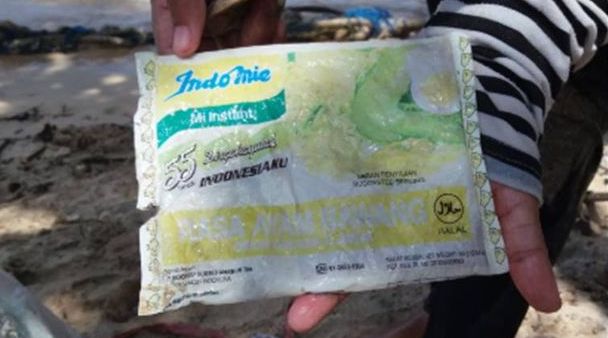A photo of plastic waste has gone viral in Indonesia, serving as a reminder to people in one of the biggest plastic waste producers on the planet of the long-term harm such disposable products can have on the environment.
The photo, first posted on Twitter over the weekend, shows an Indomie instant noodle wrapper picked up from a pile of garbage on Sendang Biru beach in Malang Regency, East Java. Unlike most plastic waste, this particular wrapper stood out because it was a special one-off product to celebrate Indonesia’s 55th anniversary — which was 19 years ago.
https://twitter.com/selfeeani/status/1114728297349373952
“In August, Indonesia will be 74 years old. But this morning I found Indomie packaging that features the writing ‘long live Indonesia, 55th anniversary’… So this wrapper has been floating in the ocean for 19 years before it got washed up on the shore,” the tweet read.
As of this morning, the tweet has been retweeted over 65,000 times, including by Fisheries Minister Susi Pudjiastuti.
Perhaps because of Indomie’s popularity, this picture struck a chord with many in the country by vividly illustrating just how long plastic waste can remain intact. Some have noted that despite its 19 years of its existence, the wrapper has only seen slight discoloration over the years (ayam bawang, or onion and chicken, flavor Indomie features yellow packaging).
Had the wrapper not been picked up, it could have remained as such for decades or possibly even centuries to come as disposable plastics can take over 400 years to decompose.
The photo was posted by Fianisa Tiara Pradani, a maritime studies student at Malang’s Brawijaya University. She said she found the wrapper while she was taking water and sediment samples from the beach.
“We found it after we took water samples and waiting for low tide. Turns out there was a lot of garbage, so we cleaned it up as well,” Fianisa told Kompas yesterday.
Indonesia holds the unfortunate distinction of being the world’s second largest producer of plastic marine waste, behind only China. A great deal of that waste comes from the 9.8 billion (!) plastic bags the country is estimated to use each year. The Indonesian government aims to reduce plastic waste by 70% by 2025.
Wildlife and the environment stand to suffer the most from the country’s obsession with plastic use. Last year, a dead sperm whale washed up on the shores of Wakatobi with 5.9 kilograms of plastic waste in its stomach, including plastic bags, bottles, and even flip-flops.
Watch:





Reader Interactions